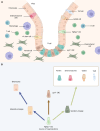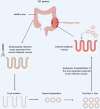Roles of intestinal stem cells in inflammatory bowel disease pathogenesis
- PMID: 40951705
- PMCID: PMC12427060
- DOI: 10.4252/wjsc.v17.i8.107639
Roles of intestinal stem cells in inflammatory bowel disease pathogenesis
Abstract
Inflammatory bowel disease (IBD), consisting primarily of ulcerative colitis and Crohn's disease, is a chronic, relapsing inflammatory disorder of the gastrointestinal tract. The pathogenesis of IBD has been thoroughly studied throughout the past few decades, such as defective gut epithelial barrier, immune responses, genetic predisposition, infections, and dysbiosis. Recent studies have revealed the unexpected importance of intestinal stem cells (ISCs) in the pathophysiology of IBD. The rapid recovery and continuous self-renewal of intestinal epithelial cells depend on ISCs within the crypts. Proliferation and differentiation of ISCs is an important cytological basis for repairing damaged intestinal mucosa. Unfortunately, as a new therapeutic goal in IBD, mucosal healing is difficult to achieve with current treatments. Stem cell therapy is an emerging treatment for IBD that allows mucosal healing by rebuilding the mucosal barrier. In this review, we present the current research progress on the role of ISCs in IBD and discuss stem cell-based therapies that have been specifically designed for its treatment.
Keywords: Clinical application; Inflammatory bowel disease; Intestinal stem cells; Pathogenesis; Therapy potential.
©The Author(s) 2025. Published by Baishideng Publishing Group Inc. All rights reserved.
Conflict of interest statement
Conflict-of-interest statement: All the authors report no relevant conflicts of interest for this article.
Figures



References
Publication types
LinkOut - more resources
Full Text Sources
Miscellaneous

